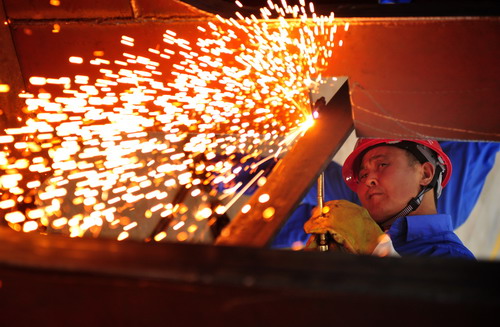'China's growth benefits world'
Updated: 2011-11-02 14:00
By Zhang Chunyan and Chen Jia (China Daily)
|
|||||||||||
|
A welder works at the Jianghan Equipment Base of the China Railway 11th Bureau Group in Xiangyang, Hubei province, earlier this year. [Photo / Xinhua] |
LONDON / BEIJING - China's economic growth and economic restructuring benefit the world economy, which is now at risk of recession, say experts.
"China has become the global economy's primary dynamo, generating both growth and opportunity for many of the world's companies within China, whilst massively increasing its own foreign direct investment flows globally," Guy Dru Drury, chief representative of the Confederation of British Industry in China, told China Daily in an exclusive interview.
Clearly the growth and long-term potential of China's domestic economy is of great importance to international business, especially at a time when markets in the developed world are slowing down, Drury added.
China has been responsible for fostering more prosperity than any other economy in the world in the past 20 years, said Kerry Brown, head of the Asia Programme at the London-based think tank Chatham House, who is also leading the Europe China Research and Advice Network, which advises European policymakers on events in China.
As Brown put it, "Indeed, according to the World Bank, were China's figures to be deducted from global GDP, there would have been little wealth creation in the last two decades."
Those comments came just before the G20 summit, which is to take place in Cannes, France, on Thursday and Friday. Among the topics believed to be of greatest interest at the summit are the European debt crises and ways to ensure the sustainable, balanced development of the world economy.
Ning Lutao, lecturer of international business at the Durham Business School in England, also pointed out that China's domestic economic restructuring has had profound implications for the heavily indebted West.
After enjoying a decades-long economic boom built on cheap labor and the intensive use of energy, China is making an attempt to diversify the sources of its economic growth, which are now mainly in trade and domestic investment.
"This will lead to a change in the pattern of China's overseas direct investment, taking it from seeking markets and natural resources to acquiring strategic assets for research and development, proprietary technology, design facilities and brands, which are abundant in Western economies," Ning said.
Since China plans to increase its domestic consumption, Ning said its market will become much more of an export destination for the US and European goods and services. "This again creates job opportunities, reduces fiscal deficits and boosts economic growth in the US and the European Union," Ning added.
Such opinions were echoed by other experts.
"For the EU and the US, the great challenge now is not to see China as a source of cheap, manufactured goods, or as a vast pool of labor, but in fact to see the domestic market in China as the key for growth in the coming decade," Brown said.
Brown said that raises important questions about how European and American companies will manage to enter the international Chinese market and find sales and marketing methods that will succeed with Chinese consumers.
To promote global economic development and help resolve the current debt crisis, "The US and the EU should be more open to Chinese overseas direct investment, since this can lead to the addition of more jobs and encourage development," Ning said.
To ensure China, the US and members of the European Union benefit from trading and investing in each other's economies, Ning said, it is important to make trade and investment regulations more transparent, clarify new regulations and related domestic policies and show a greater commitment to the World Trade Organization's rules.
Xu Hongcai, a senior economist with the China Center for International Economic Exchange, a government think tank, said that China's economic growth is expected to remain steady in coming years.
He said economists predict the country's GDP will increase by more than 9 percent this year, although it is likely to slow down soon.
Besides increasing exports, the country is also taking steps to import more. Xu said that will help reduce both trade surpluses and trade frictions.
"China's growing imports will play an important role in fueling the anemic global economy."
"I have no worry about a double dip in the world's economy because the eurozone's rescue plan is expected to solve the (EU countries') debt problems in the short term," according to Xu.
Cecily Liu contributed to this story.
- $31b govt stimulus to revive railway projects
- Home prices slide again in October
- Shanghai to lure more financial pros
- Solar PV firms say US dumping petition harmful
- Sugar imports head for record
- Firms boost overseas office rentals
- Farm produce prices fall for third week
- BASIC countries reach Kyoto consensus











